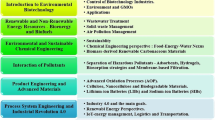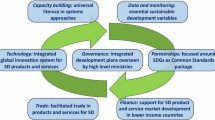Abstract
This article contributes to the debate on governance of emerging technologies, focusing in particular on the international level and taking into account the fact that these technologies are developed through a common effort of different stakeholders including governments, research communities, industry and civil society actors. These issues are explored from the perspective of communitarian ethical criticism of liberal social contract thinking, in order to enhance visibility of the influence collective non-state actors exercise on the development of these technologies. In particular, the effect of different values in the discussion on emerging technologies on the perceived governance options is explored. A paradigm shift from defensive values such as security, risk and human rights to more optimistic values like peace, justice and integrity of creation is proposed and discussed.
Similar content being viewed by others
Notes
The Guardian, 4-09-2006, http://www.guardian.co.uk/commentisfree/2006/sep/04/syria.israel
INI website, 10-04-09, http://www.en.nano.ir/
Jane’s 02-12-2008, http://www.janes.com/extracts/extract/gulfsu/irans090.html
Mehr News Agency, 23 August 2005, cited by RedOrbit News www.redorbit.com/modules/news/tools.php?tool=print&id=297326
Examples are the EU funded ICPC-NanoNet project which stimulates research cooperation in nanotechnology between Europe and Developing Countries and Emerging Economies including not only natural sciences and engineering but also social sciences and humanities and policy makers: www.icpc-nanonet.org and the project Nanorecht en Vrede, supported by Nanopodium www.nanopodium.nl in the Dutch Societal Dialogue Nanotechnology.
These three values could be considered a shorter version of the seven principles proposed by the European Commission in its Code of Conduct for Responsible Nanotechnology Research: meaning, sustainability, precaution, inclusiveness, excellence, innovation and accountability.
Whose authority can only be overruled in exceptional circumstances by the international community in accordance with Just War Theory.
References
AIVD (2010). Kwetsbaarheidsanalyse spionage. Spionagerisico's en de nationale veiligheid. Ministerie van Binnenlandse Zaken en Koninkrijksrelaties, Algemene Inlichtingen en Veiligheidsdienst. Den Haag
Altmann J (2005) “Nanotechnology and Preventive Arms Control,” Deutsche Stiftung Friedensforschung, Osnabrück. <http://www.bundesstiftung-friedensforschung.de/projektfoerderung/archivforschung/forschungsprojekte/suter1.html>
Altmann J (2006) “Military Nanotechnology; Potential Applications and Preventive Arms Control”, in Contemporary Security Studies, Routledge, Oxon
Altmann J (2008) “Präventive Rüstungskontrolle.” Die Friedens-Warte 83 (2–3):105–125
Argentinian Parliament website, database of legislative projects: http://www.hcdn.gov.ar/ > Proyectos > Busqueda General
Bell D (2009) Communitarianism. In: Stanford encyclopedia of philosophy, http://plato.stanford.edu/entries/communitarianism/
Broude T, Shany Y. (2008) The shifting allocation of authority in international law, volume 19: studies in international law. Oxford and Portland, Oregon
DoD (2007) Defense nanotechnology research and development program. Department of Defense, Director, Defense Research and Engineering, http://www.nano.gov/html/res/pdf/DefenseNano2007.pdf
EC (2008) Commission recommendation of 07/02/2008 on a code of conduct for responsible nanosciences and nanotechnologies research. European Commission. Brussels, C 424 final http://ec.europa.eu/nanotechnology/pdf/nanocode-rec_pe0894c_en.pdf (last accessed 27-07-2012)
Euractiv (2007) “Scientists press EU to free up stem cell research,” Euractiv, 30 July 2007. <http://www.euractiv.com/en/science/scientists-press-eu-free-stem-cell-research/article-165938>
Foladori G. (2006) Nanoscience and nanotechnology in Latin America. Nanowerk, http://www.nanowerk.com/spotlight/spotid=767.php
Habermas, J (2005) Zwischen Naturalismus und Religion. Suhrkamp Verlag, Frankfurt am Main. <http://www.perlentaucher.de/buch/21806.html>
Howse RL, Nicolaidis K (2008) Democracy without sovereignty: the global vocation of political ethics. In Broude T, Shany Y (eds) The shifting allocation of authority in international law, volume 19: studies in international law. Oxford and Portland, Oregon
Ishay MR (2004) The history of human rights; from ancient times to the globalization era. University of California Press, Berkeley, http://books.google.nl/books?hl=nl&lr=&id=YTh22XQrtlQC&oi=fnd&pg=PR9&dq=ishay+history+human+rights&ots=xrtBSCVVQb&sig=jBFc4jnOvL9iJUGXEvplt6cS-qs#v=onepage&q&f=true
KNAW (2008) A Code of Conduct for Biosecurity; Report by the Biosecurity Working Group. Royal Netherlands Academy of Arts and Sciences, Amsterdam
Malsch I (2011) Ethics and Nanotechnology; Responsible development of nanotechnology at global level in the 21st century. PhD thesis Radboud University, Nijmegen
Malsch I (2012) The just war theory and the ethical governance of research. Sci Eng Ethics. Published online 28 February 2012 doi:10.1007/s11948-012-9357-8. http://www.springerlink.com/content/d85w001pj6727512/
Nussbaum MC (2006) Frontiers of Justice: Disability, Nationality, Species Membership. (The Tanner Lectures on Human Values) Boston: Harvard University Press
Peres S (2003) Nanotechnology holds key to the future, (adapted from a speech given at the Knesset), in Israel 21c, 13 April 2003, www.israel21c.org
Rawls J (1971) A theory of justice. Harvard University Press, Cambridge, MA
Rosa H (2006) Kommunitarismus. In: Düwell M, Hübenthal C, Werner MH (eds) Handbuch Ethik, 2. Auflage. J.B. Metzler Verlag, Stuttgart
van den Hoven, MJ (2010) Privacy onder druk door nieuwe technologie. [privacy under pressure of new technology]. Presentation Conference Nanotechnologie, Peace and Security Campus Den Haag
von Schomberg, R (2007) From the ethics of technology towards an ethics of knowledge policy and knowledge assessment. European Commission Working Document EUR 22429, Brussels. http://ec.europa.eu/research/science-society/pdf/ethicsofknowledgepolicy_en.pdf
Walzer M (1977) Just and unjust wars: a moral argument with historical illustrations. Basic Books. http://books.google.nl/books?id=du-2AAAAIAAJ&dq=walzer+just+war&source=gbs_book_other_versions_r&cad=5
Walzer M (1994) In: Walzer M (ed) Thick and thin; moral argument at home and abroad. University of Notre Dame Press. http://undpress.nd.edu/book/P00445
Wils (2010) Versuche über Ethik. In: Wils J-P (ed) Studien zur theologischen Ethik, Band 108. Academic, Fribourg (?)
Acknowledgments
In the writing of this article I have benefited greatly from discussions with Jean-Pierre Wils and participants in several events where I have presented my ideas. The empirical data have been collected over the years in different projects funded by the EU and other organisations and analysed from the present perspective. The views expressed herein are the sole responsibility of the author. This article is adapted from chapter 7 in my PhD thesis [16].
Author information
Authors and Affiliations
Corresponding author
Rights and permissions
About this article
Cite this article
Malsch, I. Governing Nanotechnology in a Multi-Stakeholder World. Nanoethics 7, 161–172 (2013). https://doi.org/10.1007/s11569-012-0163-1
Received:
Accepted:
Published:
Issue Date:
DOI: https://doi.org/10.1007/s11569-012-0163-1




